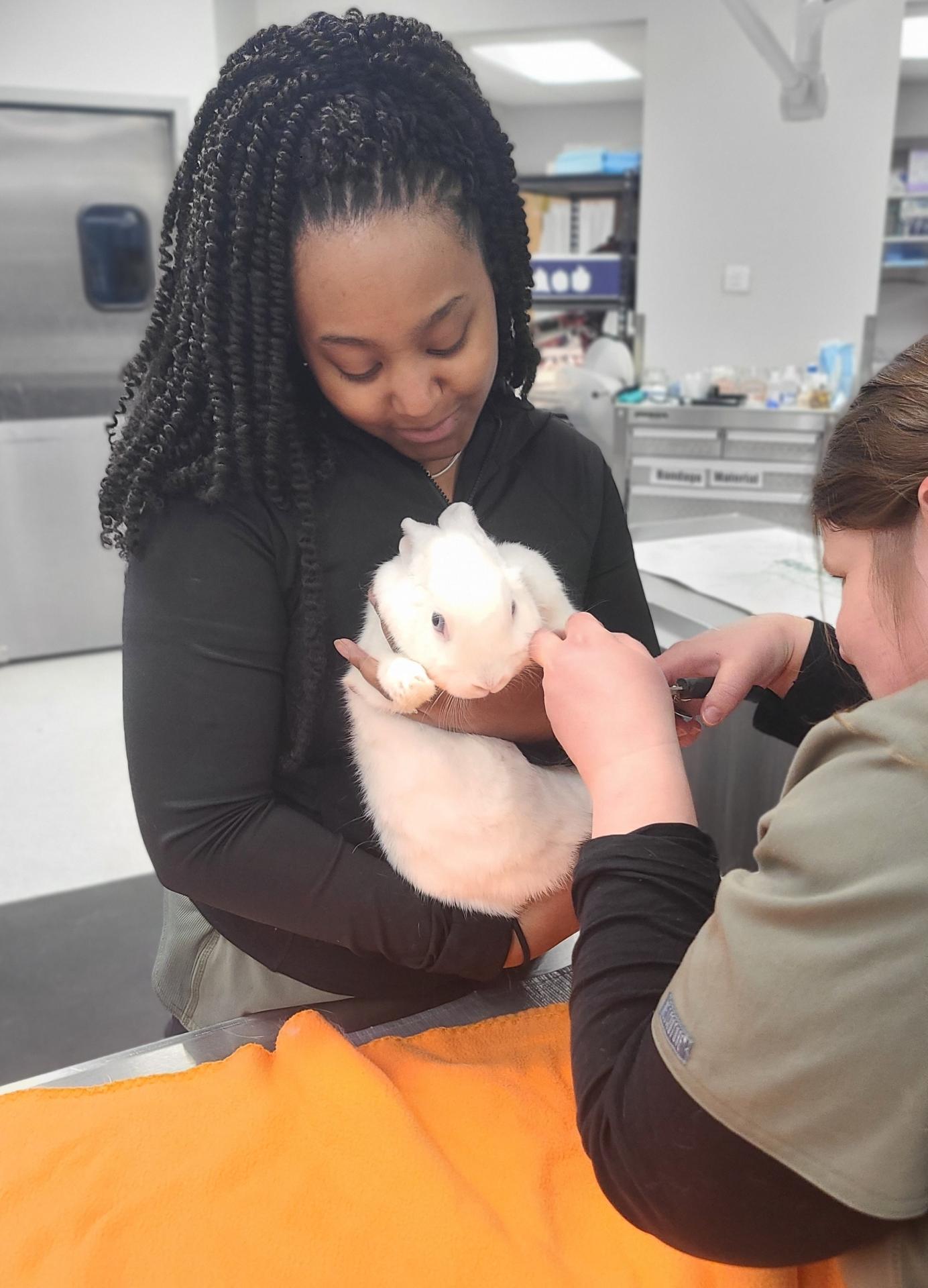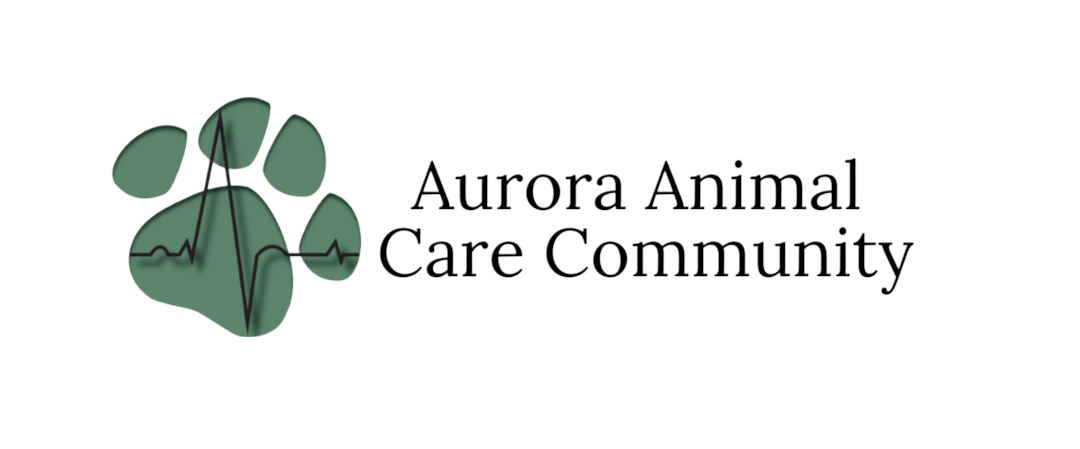By: Christine Koporc MSc and Robin Rosen-Sharp DVM, CCRP
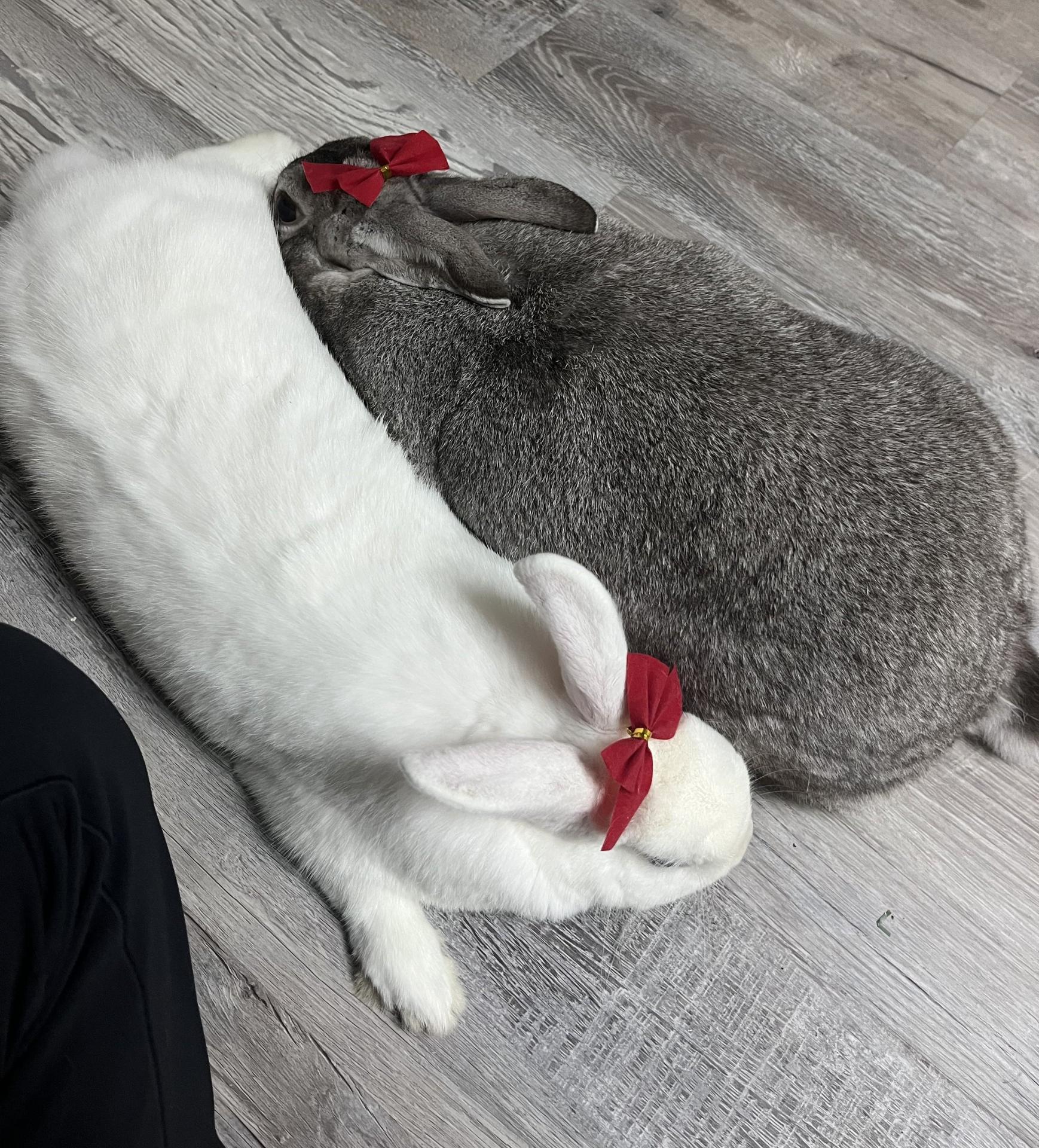 Bunny rabbits are a popular pet choice and a wonderful family addition for owners who understand their distinct needs and personalities. Unlike dogs and cats, bunnies are quiet yet intelligent prey animals. Rabbit husbandry (how to care for them) differs from many other animals. They are hind gut fermenters and require constant access to their food sources. Let's learn about bunnies and how to keep them happy and healthy.
Bunny rabbits are a popular pet choice and a wonderful family addition for owners who understand their distinct needs and personalities. Unlike dogs and cats, bunnies are quiet yet intelligent prey animals. Rabbit husbandry (how to care for them) differs from many other animals. They are hind gut fermenters and require constant access to their food sources. Let's learn about bunnies and how to keep them happy and healthy.
How long do pet rabbits live?
The average lifespan for a rabbit is 7-10 years with some documented to be as old as 15. Lifespan can vary depending on the breed of rabbit. Appropriate nutrition and veterinary care are important factors in their lifespan too.
What do bunnies eat?
Bunnies need three main types of food for a balanced diet: Unlimited grass hay, limited pellets, and fresh greens. Please note: DO NOT feed your rabbit seeds, nuts, corn, or "deluxe" pellets that contain seeds, nuts, or corn.
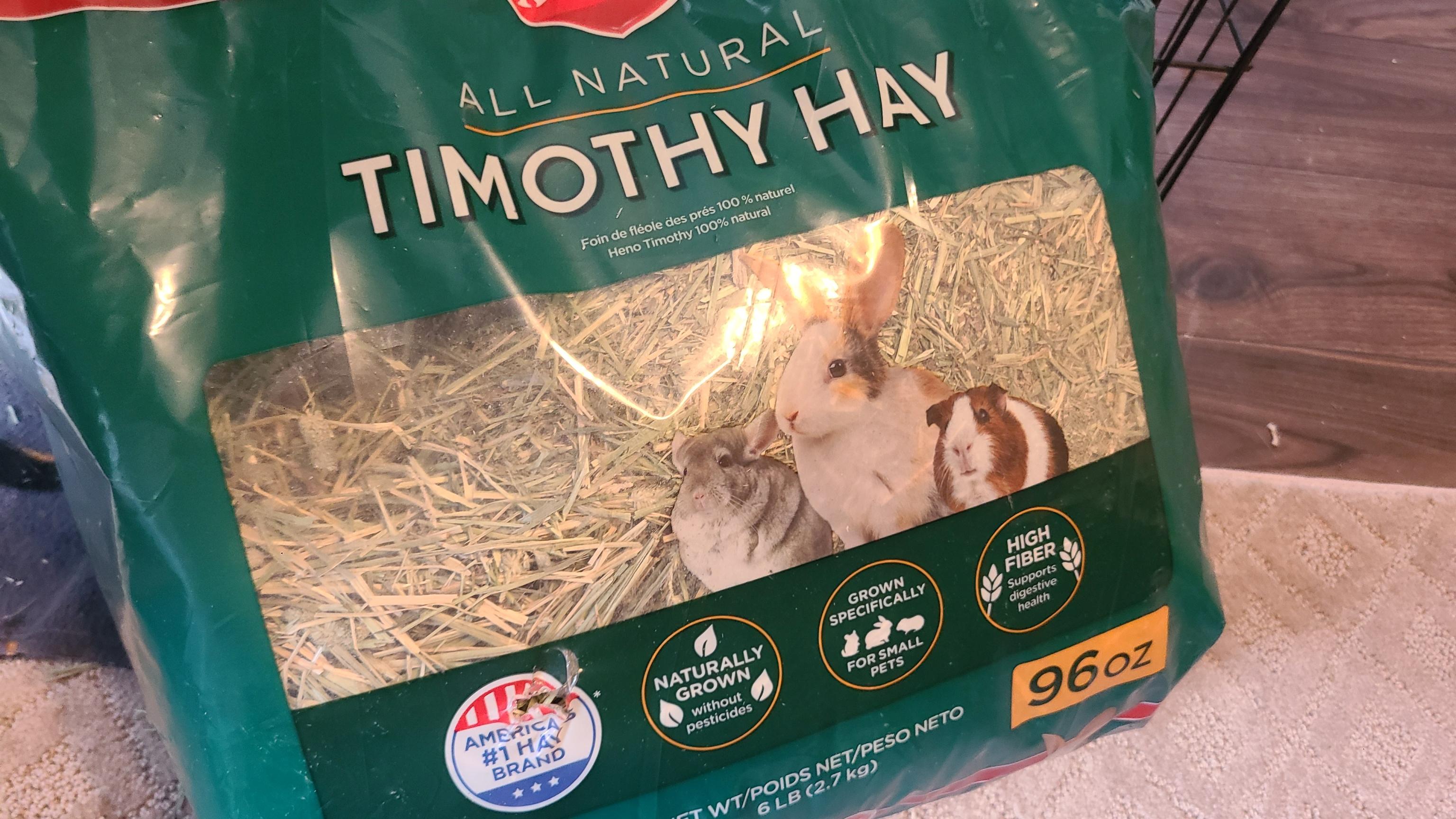 Grass Hay: Rabbits have evolved to primarily eat grass and leaves. The most important food source for bunnies is grass hay. This must be available at all times. The recommended types of grass hay are oxBow (most recommeded), timothy, meadow, oat, rye, Bermuda, or barley. When available, try to incorporate two or more types of grass hay in your bunny's diet. When choosing hay to purchase, make sure it smells fresh and is not damp or moldy.
Grass Hay: Rabbits have evolved to primarily eat grass and leaves. The most important food source for bunnies is grass hay. This must be available at all times. The recommended types of grass hay are oxBow (most recommeded), timothy, meadow, oat, rye, Bermuda, or barley. When available, try to incorporate two or more types of grass hay in your bunny's diet. When choosing hay to purchase, make sure it smells fresh and is not damp or moldy. - Limited Pellets: According to Columbus House Rabbit Society, timothy based pellets are the best choice for an adult rabbit. Try to find pellets that have at least 18-20% fiber, and no more than 16% protein. Alfalfa based products are much higher in calories and should only be used as occasional treats.
- Fresh Greens: Whenever possible, buy organic or grow your own greens and make sure to wash them thoroughly before feeding to your rabbit. The following are a list of suggested greens.
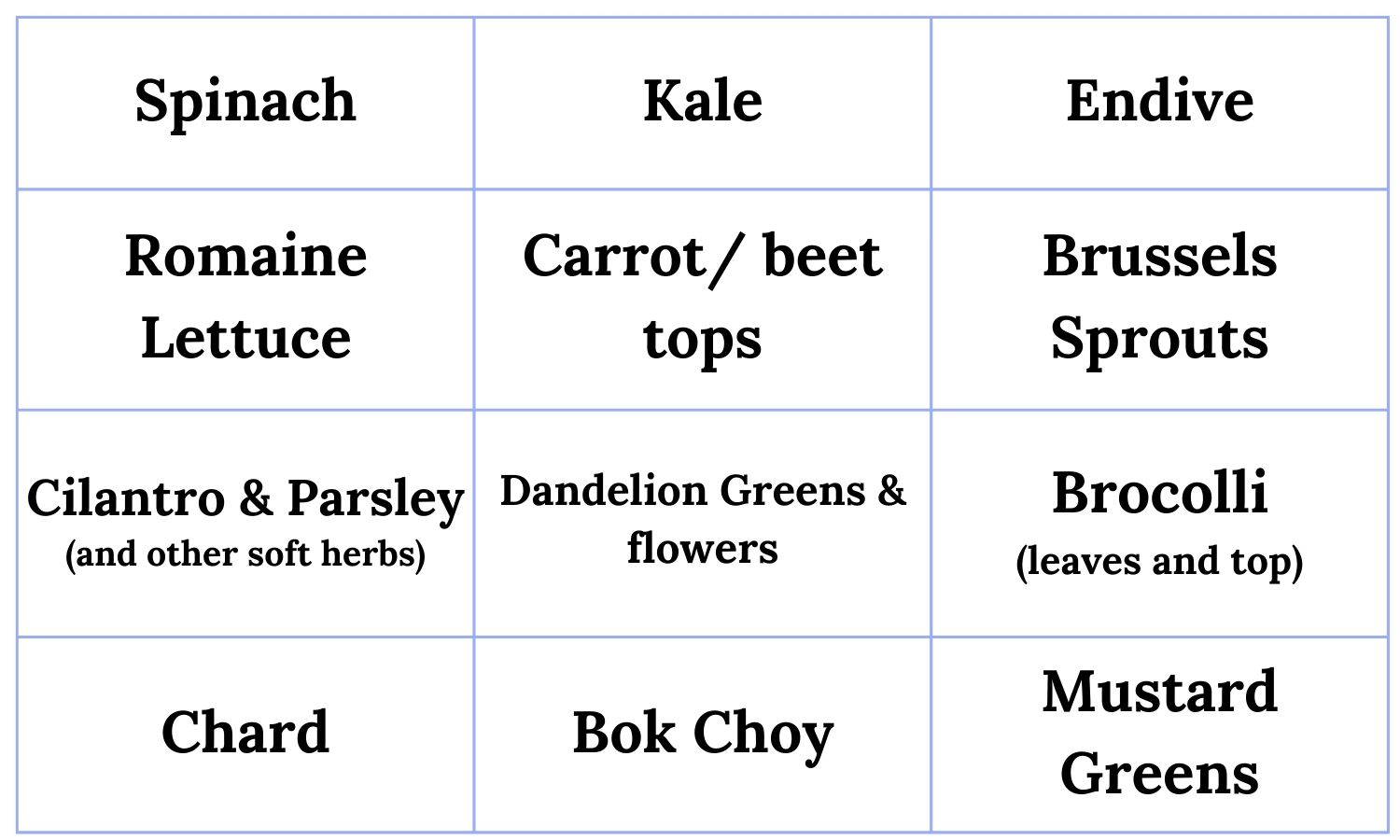
Hay! Don't Use Straw:
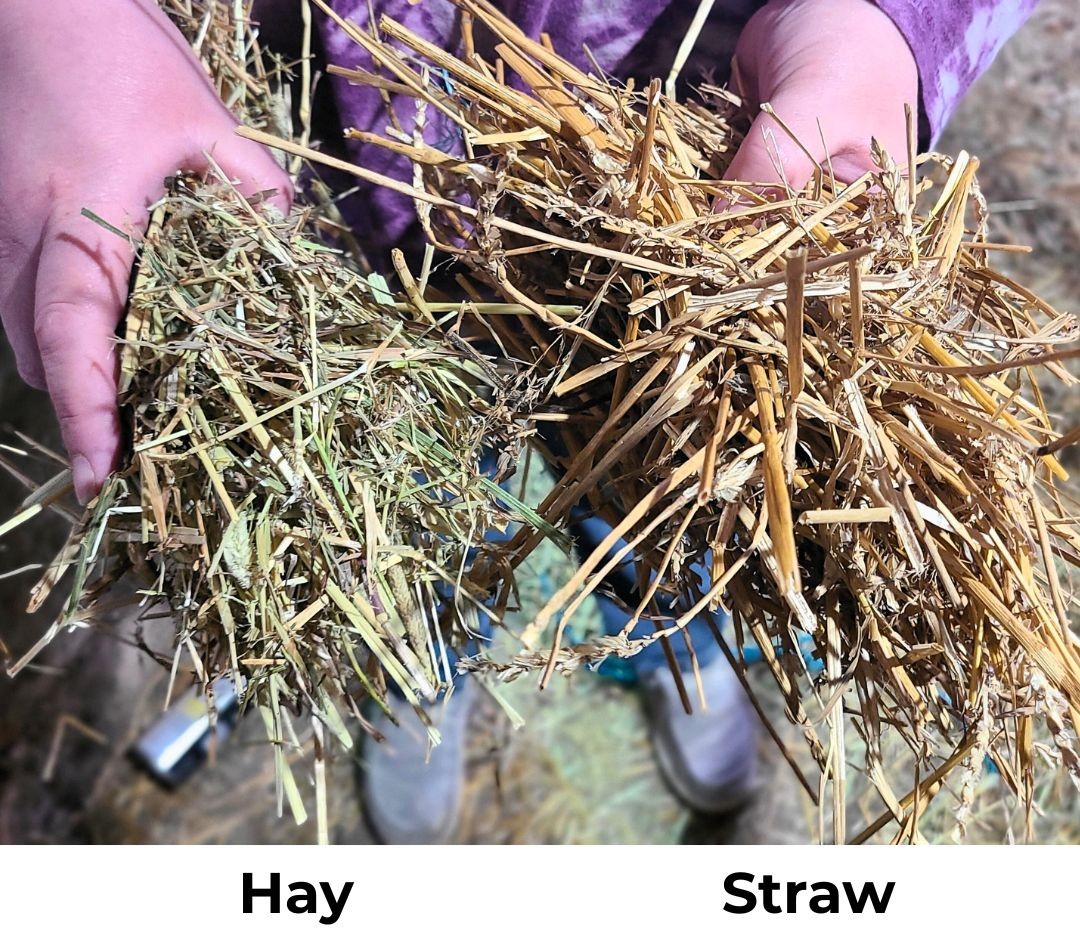 Do not feed your bunny straw. Straw is the fibrous stalk that remains after wheat or other grains are harvested. It lacks most nutrients and can lead to serious health complications for your rabbit. Hay is different as it is a complete grass that contains essential nutrients.
Do not feed your bunny straw. Straw is the fibrous stalk that remains after wheat or other grains are harvested. It lacks most nutrients and can lead to serious health complications for your rabbit. Hay is different as it is a complete grass that contains essential nutrients.
- Cecotropes: Bunnies are great at making the most out of the foods they eat. One unique thing a healthy rabbit will produce and consume is a cecotrope. This dropping is created in a part of their GI tract called the cecum. According to Veterinary Information Network, these cecotropes are packed full of amino acids, fatty acids, and vitamins. Healthy rabbits will eat these cecotropes directly from their anus so spotting one may not be a common occurrence. They are longer, green in color, coated in mucous, and usually have a strong odor. If you frequently see cecotropes in your bunny's enclosure, consult your veterinarian as this is NOT normal.
- Treat Foods: Higher calorie treat foods should be limited. Obesity can shorten their lifespan, so keeping your pet rabbit at an ideal weight is important. Identifying a high value treat is helpful when assessing their health and for training. Using these treats as an indicator of whether your rabbit is willing to eat is very helpful. Foods from this list can be used as part of a reward system as well.
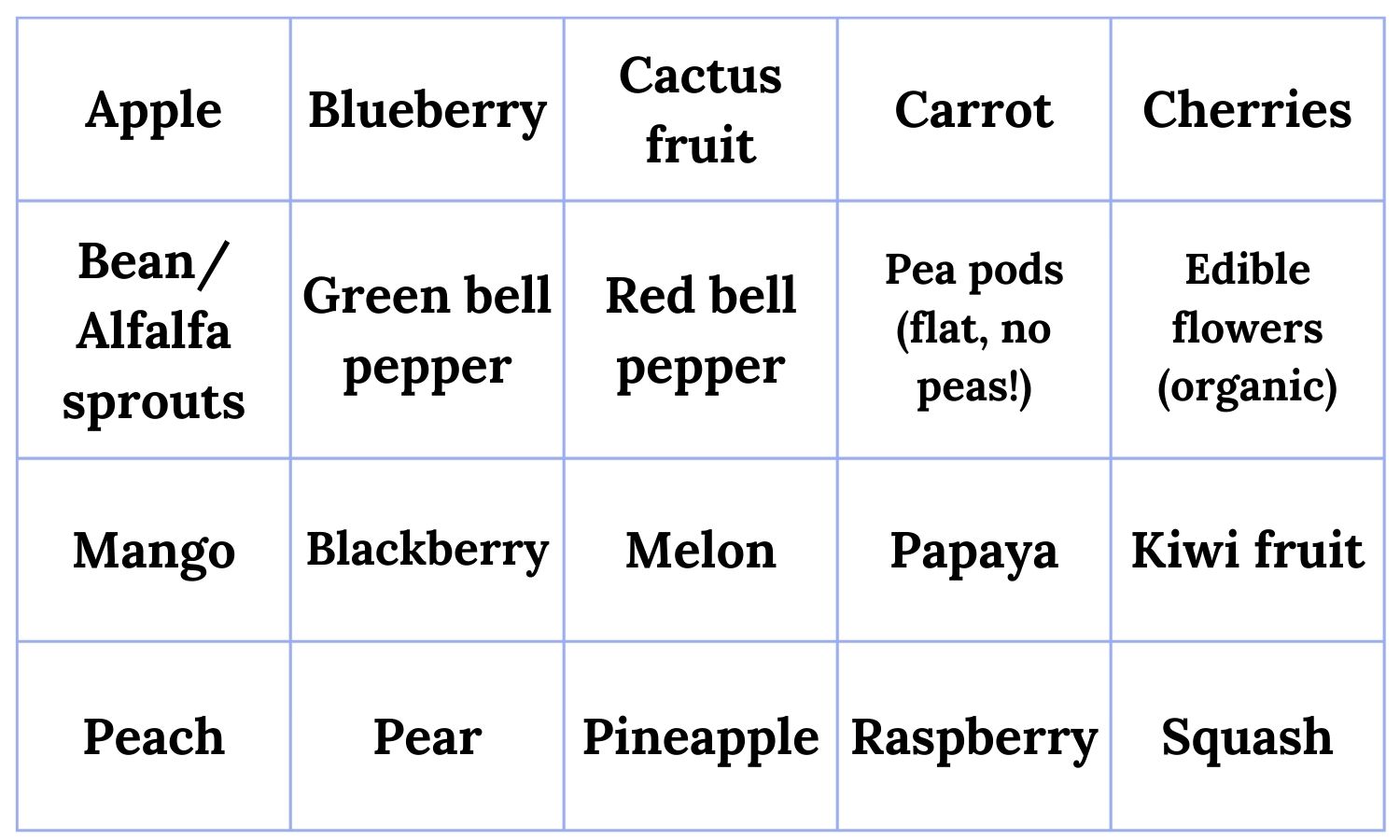
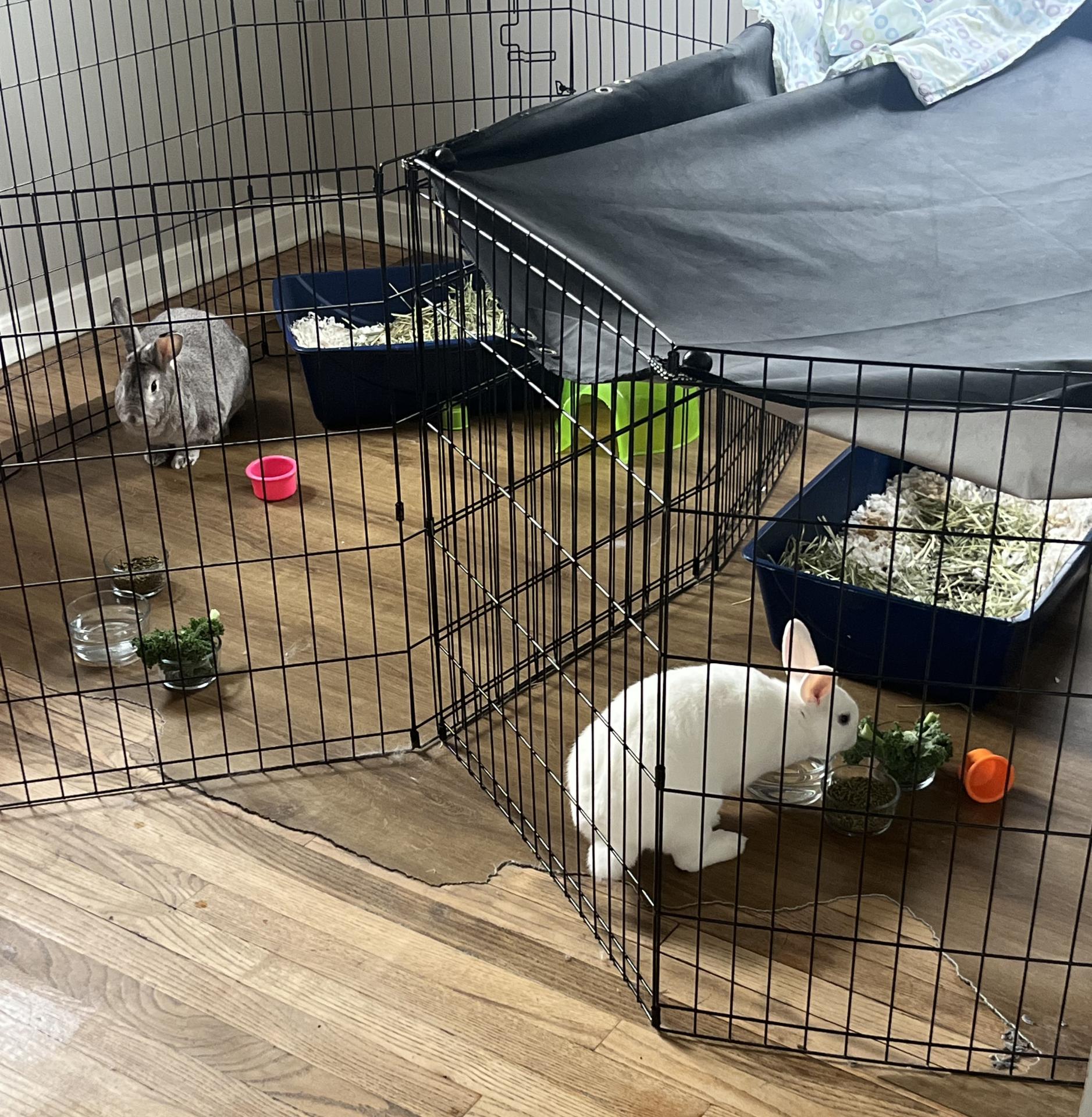 Rabbit Care Enrichment & Housing
Rabbit Care Enrichment & Housing
Domesticated rabbits should never be restricted to only cage confinement. They are meant to roam around, run, jump, and play in large areas. Exercise is another husbandry topic regarding rabbit health and wellbeing.
- Setting up their home base: Cages sold in pet stores are generally too small to properly house a rabbit. A large exercise pen is recommended. It will allow more room for your bunny to hop and play, is much easier to clean, and can be moved to adapt to different living spaces. Included in their housing should be a litter box, a cardboard "hiding" box to allow privacy, food/water bowls, and plenty of enrichment choices through toys. Make sure you keep your home at an ideal temperature for your bunny, 60-70F. Heat stroke can occur above 80 F.
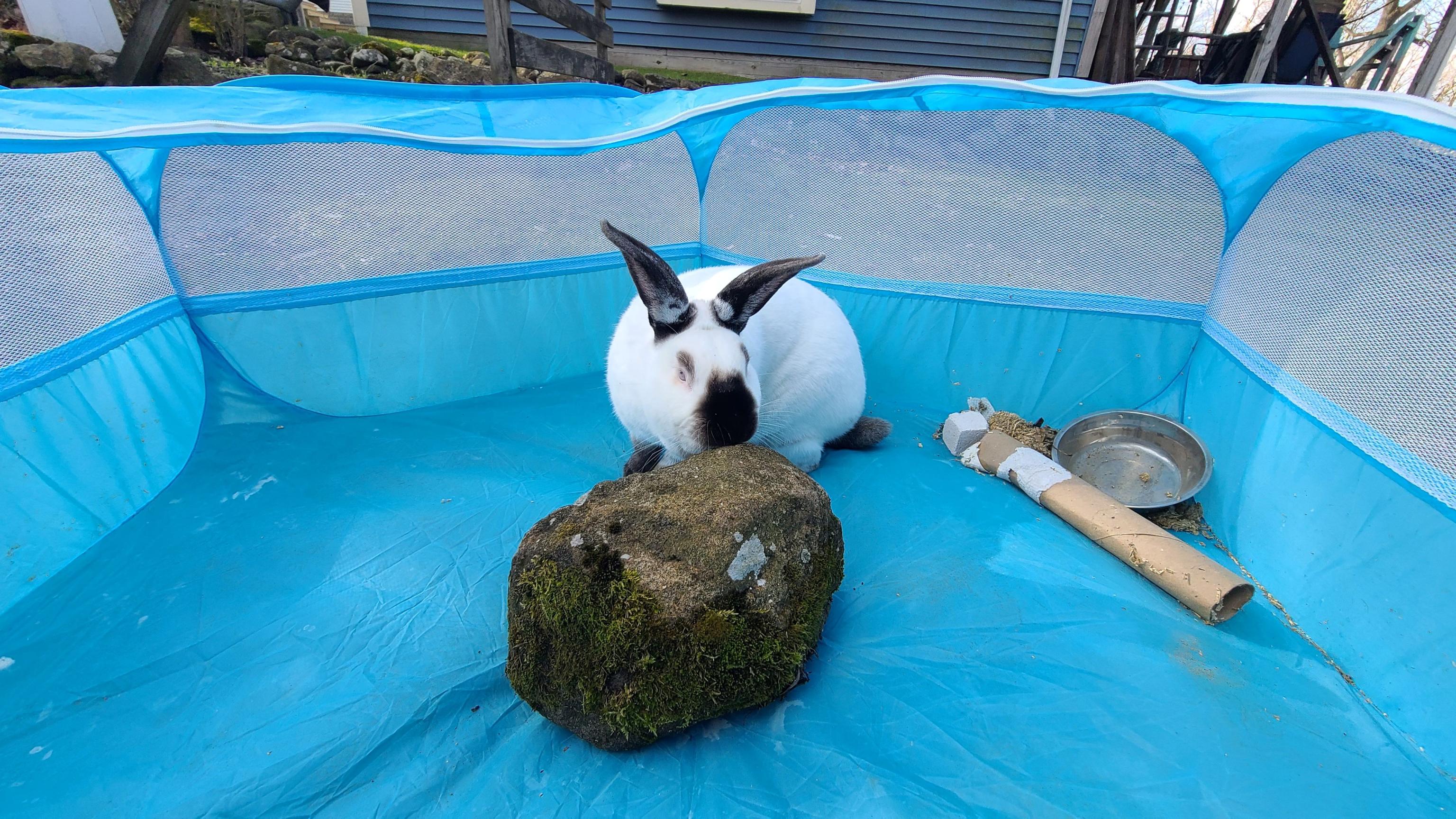
- Exercise areas: Your bunny should be allowed to roam for at least a few hours each day. Creating a safe area for them to roam using "X" pens is a great way to accomplish this. Make sure they are at least 3ft high. These pens are easy to assemble, into any desired shape. Allowing your bunny to free roam in your home is another option but make sure home is bunny proofed. Toxic plants, electrical cords, and sneaky escape routes are just a few dangers they can encounter.
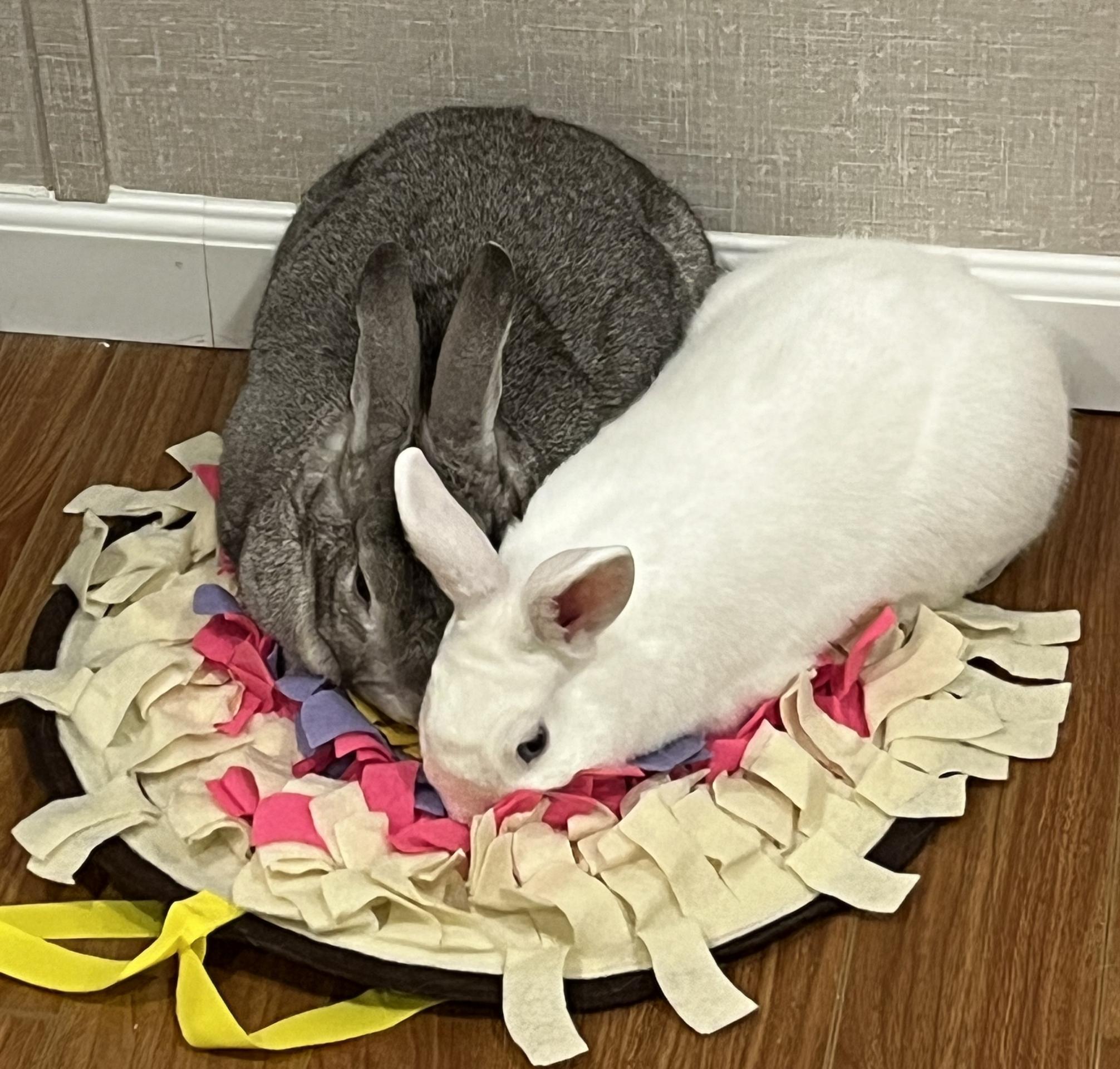 Enrichment: Rabbits do get mental stimulation just from eating their diet of grass hay and appropriate green foods. Providing toys creates additional avenues for enrichment and can help keep any behavioral issues at bay. Because bunnies like to chew, wooden chew toys designed for birds or unfinished wicker or straw baskets can be purchased for them to chew on. There are also enrichment items made of compressed timothy hay available for bunnies. According to VIN, they also love to play with things that can be moved and chewed on like empty cardboard paper towel rolls or toilet paper rolls, carboard boxes, and stacking block toys (untreated) made for little kids. You can even use these toys to hide treats or make a DIY snuffle mat. It makes finding their treats mentally stimulating by encouraging foraging behaviors.
Enrichment: Rabbits do get mental stimulation just from eating their diet of grass hay and appropriate green foods. Providing toys creates additional avenues for enrichment and can help keep any behavioral issues at bay. Because bunnies like to chew, wooden chew toys designed for birds or unfinished wicker or straw baskets can be purchased for them to chew on. There are also enrichment items made of compressed timothy hay available for bunnies. According to VIN, they also love to play with things that can be moved and chewed on like empty cardboard paper towel rolls or toilet paper rolls, carboard boxes, and stacking block toys (untreated) made for little kids. You can even use these toys to hide treats or make a DIY snuffle mat. It makes finding their treats mentally stimulating by encouraging foraging behaviors. - Litter Boxes: Our veterinarians recommend using paper based litter material. Some brands we like include Yesterday's News, Care Fresh, or just using shredded paper. Litter box training can be accomplished with your rabbit pretty easily! Start them off in a confined area with a clean litter box and make sure the sides are low enough that they are able to hop in and access it. Surprisingly, bunnies like to nibble on their grass hay while in the litter box so putting a layer of hay on top is a great idea. According to Dr. Rosen-Sharp, some will skip the paper litter layer and just use grass hay in their litter boxes. If this is done, it requires more frequent cleaning to prevent damp, contaminated hay from being consumed. Keeping track of their bathroom habits is a top priority as changes can indicate a health concern. A fecal sample should be checked by your veterinarian at least once a year. This microscopic evaluation can reveal hidden parasites.
- Resting & Hiding Places: Bunnies in the wild would spend a large part of their day resting and hiding in burrows. This innate need is not lost in domesticated pet rabbits. You must provide safe protected areas they can hide in. Untreated wicker baskets, straw baskets, and cardboard boxes that provide opportunities for chewing are also great burrows. Cardboard tubes can be incorporated and a natural or created entrance is a must. Make their areas more cozy by adding fleece or baby blankets that are easy to wash when they are soiled. It is not recommended to use carpet squares as ingestion can cause an obstruction.
Rabbit Veterinary Care
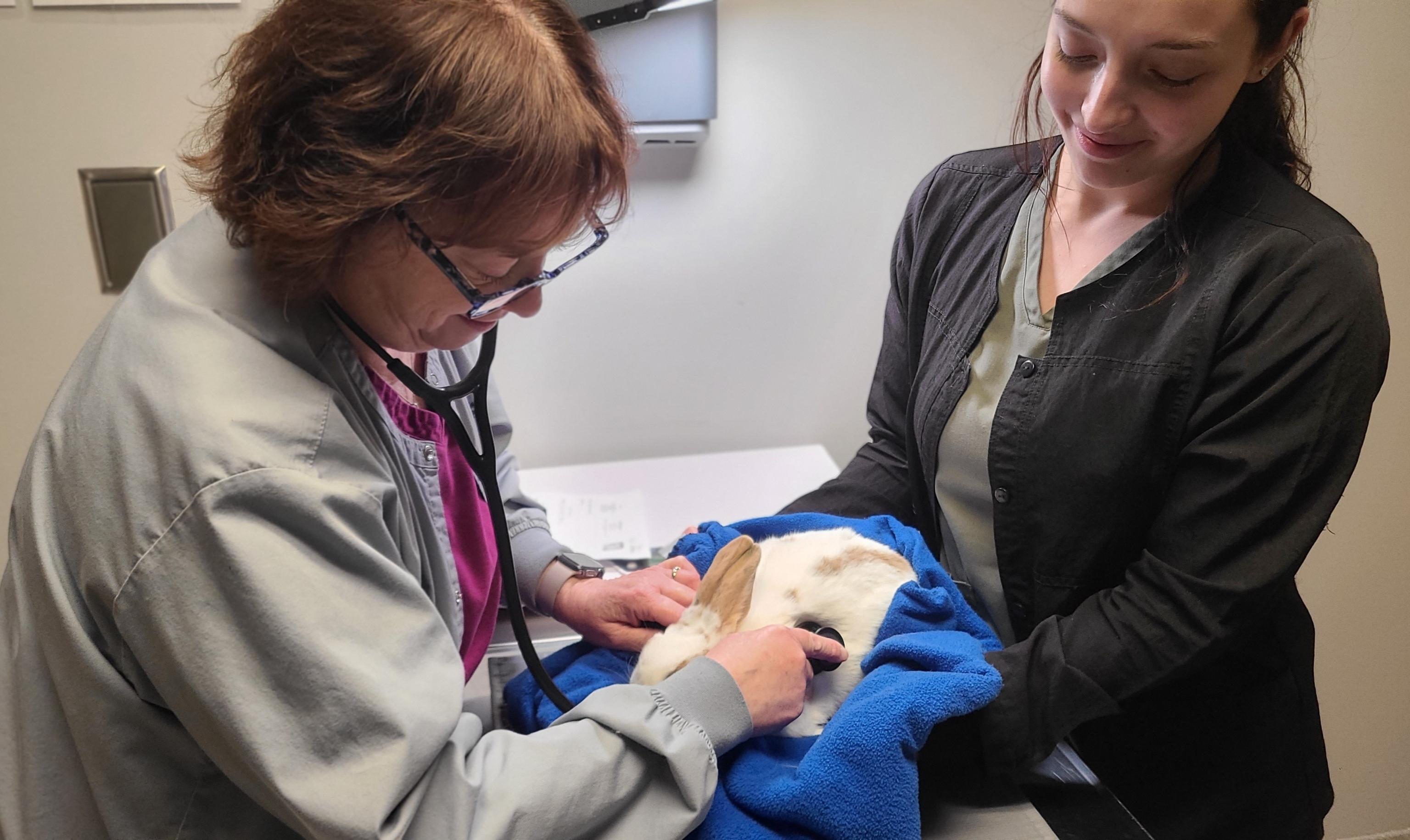 Not all veterinarians are confident in caring for rabbits. Lucky for you, you do in fact have a rabbit vet near you. Our three clinic practice has two veterinarians with many years of experience in rabbit veterinary care. A preventive healthcare visit to establish your bunny with us is integral to addressing and staying ahead of any healthcare issues. Rabbits are unique creatures with very specific needs. During a routine physical exam, the doctor will evaluate their entire body including eyes, ears, heart, and teeth. Dental disease occurs commonly in pet rabbits. They need their teeth checked to make sure their bite is appropriately aligned. Painful oral health issues can cause your rabbit to stop eating. Rabbits must be eating all the time because of how their sensitive digestive system works. If a rabbit stops eating that is an emergency that cannot wait. The doctor will also review current feeding and housing regimes to make sure they are appropriate. Additional veterinary services we offer include nail trims, spay and neuter surgeries, blood work, and fecal analysis (remember, this should be completed at least once a year to check for parasites). A key preventive health measure is vaccination for Rabbit Hemorrhagic Disease Virus (RHDV). It is recommended that every rabbit is vaccinated for this contagious and deadly virus. To learn more about this emerging disease and vaccination option, visit our Rabbit information page.
Not all veterinarians are confident in caring for rabbits. Lucky for you, you do in fact have a rabbit vet near you. Our three clinic practice has two veterinarians with many years of experience in rabbit veterinary care. A preventive healthcare visit to establish your bunny with us is integral to addressing and staying ahead of any healthcare issues. Rabbits are unique creatures with very specific needs. During a routine physical exam, the doctor will evaluate their entire body including eyes, ears, heart, and teeth. Dental disease occurs commonly in pet rabbits. They need their teeth checked to make sure their bite is appropriately aligned. Painful oral health issues can cause your rabbit to stop eating. Rabbits must be eating all the time because of how their sensitive digestive system works. If a rabbit stops eating that is an emergency that cannot wait. The doctor will also review current feeding and housing regimes to make sure they are appropriate. Additional veterinary services we offer include nail trims, spay and neuter surgeries, blood work, and fecal analysis (remember, this should be completed at least once a year to check for parasites). A key preventive health measure is vaccination for Rabbit Hemorrhagic Disease Virus (RHDV). It is recommended that every rabbit is vaccinated for this contagious and deadly virus. To learn more about this emerging disease and vaccination option, visit our Rabbit information page.
We are here to help:
Our trained veterinarians look forward to meeting your bunny and answer any questions or concerns you have. Our Rabbit Information Page was developed as an extensive resource for easy access to essential husbandry information. Links to other reliable rabbit materials are listed here as well. Call us to schedule your bunny's yearly preventive exam with one of our rabbit veterinarians today.
